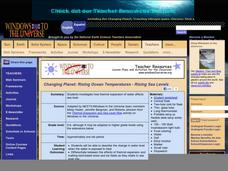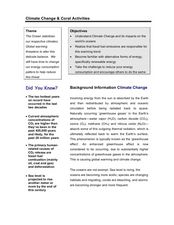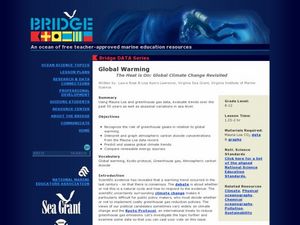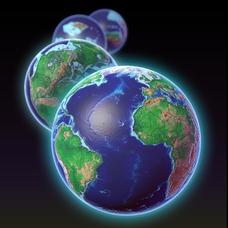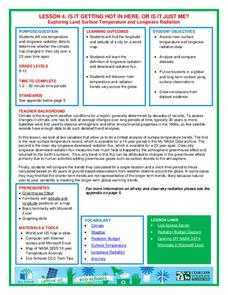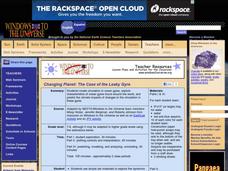Chicago Botanic Garden
Climate Change Around the World
You know climate change is happening when you see a bee take off its yellow jacket. Part four in a series of five lessons explores all factors affecting climate change: temperature, cloud cover, precipitation, and carbon dioxide. By...
Chicago Botanic Garden
Climate Change Around the World
It is unknown if cloud cover increases in response to carbon dioxide levels changing, helping climate change slow down, or if cloud cover decreases, allowing Earth to warm faster. Part four in the series of five lessons has classes...
Chicago Botanic Garden
Impacts of Climate Change
Scholars become experts on the eight major impacts of climate change through a jigsaw and grand conversation. They then research and present what they learned about effects specific to their region.
Chicago Botanic Garden
Review and Assessment: Causes and Effects of Climate Changes
The last activity in the series of five is a short one where individuals show what they've learned about the causes and effects of climate change. Working independently, they fill in a graphic organizer, then compare their notes with a...
PBS
The Ocean and Climate: Heat Redistribution
Here on Earth, heat goes with the flow! Young climatologists dive in to the connection between ocean currents and heat distribution during a science lesson. Scholars work with interactive and print resources to create a thorough...
Curated OER
A Comparison of Cloud Coverage Over Africa
Students use a NASA satellite data to contrast amounts of cloud coverage over different climate regions in Africa. They explore how Earth's major air circulations affect global weather patterns, and relate to local weather patterns.
US Environmental Protection Agency
Sea Level: On the Rise
With the global temperature on the rise, the effects of climate change are starting to be seen. However, many people have a difficult time conceptualizing the long-term effects, such as sea levels rising. Given an easy and effective...
McAuliffe-Shepard Discovery Center
Global Warming in a Jar
This well-organized lab activity introduces earth science pupils to the greenhouse effect. They will set up two experiments to monitor temperatures in an open jar, a closed jar, and a closed jar containing water. Ideally, you would have...
Curated OER
Changing Planet: Rising Ocean Temperatures - Rising Sea Levels
As an anticipatory set, young environmental technicians watch a video about how ocean temperatures seem to be changing along with the global climate. They perform a laboratory demonstration with the purpose of observing what happens to...
Curated OER
Climate Change & Coral Activities
Learners study how the ocean stabilizes our planet's climates and how global warming is becoming a threat to this fine balance. In this climate change lesson plan, students identify that fossil fuel emissions are responsible for global...
Curated OER
Climate Change: Is there a Controversy
Learners explore climate changes. In this climate changes activity, students research what causes changes. Learners search the Internet, summarize reports they find and create a poster with the information.
Curated OER
Water Cycle, Weather, and Climate
Eighth graders investigate the water cycle and its processes. They examine temperature and precipiation data to classify climate of ten cities. They then create a climate map of the world.
California Academy of Science
Climate Change Impacts
Getting kids thinking about climate change now, will hopefully push them into action when they become adults. Young environmentalists discuss the evidence and causes of climate change seen in the state of California. They brainstorm ways...
Curated OER
The Atmosphere
Here is a suitable set of slides to use when teaching about the layers of the atmosphere, climate, global winds, and types of clouds. These slides will support a few different lectures. You will probably want to replace the diagrams with...
Curated OER
Global Warming - The Heat is On: Global Climate Change Revisited
After listening to your lecture on climate change, young scientists access NOAA's database listing Mauna Loa's carbon dioxide data. They graph the monthly means and then compare their graphs to NOAA's. This is a concise plan that could...
Howard Hughes Medical Institute
EarthViewer
Can you imagine Washington DC and London as close neighbors occupying the same continent? Learners will be fascinated as they step back in time and discover the evolution of the earth's continents and oceans from 4.5 billion years ago to...
National Wildlife Federation
Is It Getting Hot in Here, or Is It Just Me?
Currently, only 2.1% of global warming is felt on continents, while over 93% is felt in the oceans. The fourth lesson in the series of 21 on global warming is composed of three activities that build off one another. In the first...
National Wildlife Federation
The Tide is High, but I’m Holding On… Using ICESat Data to Investigate Sea Level Rise
Based on the rate of melting observed from 2003-2007 in Greenland, it would take less than 10 minutes to fill the Dallas Cowboys' Stadium. The 17th lesson in a series of 21 has scholars use the ICESat data to understand the ice mass...
Curated OER
What is Climate?
In this weather learning exercise, students identify and explain the factors that can affect the climate in each area of the illustrated map. Then they describe the various effects of these factors, such as air pressure systems and the...
Curated OER
Changing Planet: The Case of the Leaky Gyre
The fascinating video "Changing Planet: Fresh Water in the Arctic," introduces your oceanographers to the world's gyres. They learn that melting sea ice is making the gyres larger, and that the changes could, in turn, contribute even...
Wild BC
Carbon Sinks and Sources
Earth or environmental science pupils are assigned to be carbon sources or sinks. They ask yes-or-no questions to try to figure out which one they are. Then they discuss ways people can have positive effects on the changing climate by...
Curated OER
Changing Planet: Fading Corals
Show the six-minute video, "Changing Planet: Fading Corals," and then demonstrate how calcium carbonate forms a precipitate in the presence of carbon dioxide. Separate your scientists into small groups to gather information about coral...
Consortium for Ocean Science Exploration and Engagement (COSEE)
One Ocean: It Matters!
Here is the first of four poignant lessons on how humans and oceans interact, even if people live far from the coast. This particular lesson also examines studies that are taking place in Antarctica of how climate change is affecting the...
Curated OER
Ocean Circulation
In this physical oceanography PowerPoint, viewers learn about ocean circulation, sea surface temperatures, and salinity. Relationships among these aspects are explained, as well as their impact on the atmosphere and climate. Each slide...










